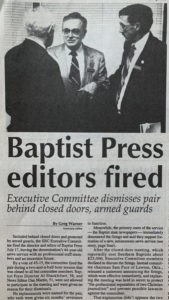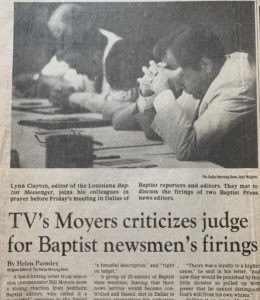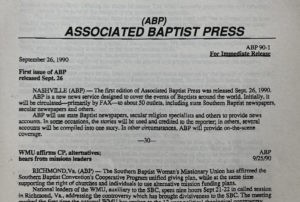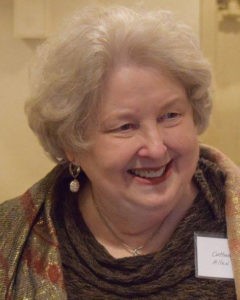The birth of Baptist News Global — formerly Associated Baptist Press — 30 years ago today was the offshoot of a decade or more of theological rift between two factions in Southern Baptist life.

This article in the Florida Baptist Witness about the BP firings shows a photo of SBC Executive Committee President Harold Bennett telling Dan Martin and Al Shackleford they had been fired. Ironically, the story was written by Greg Warner, who nine months later would be hired to lead ABP.
But theological posturing aside, the July 17, 1990, firing of Baptist Press Editor Dan Martin and SBC Vice President of Public Relations Al Shackleford signaled a sea change in how Southern Baptists would forever get their news. The terminations — behind closed doors with armed security preventing any laity to hear the charges and witness the proceedings — garnered national attention in secular and religious media outlets.
Martin was quoted in the New York Times on July 19 saying, “We were fired because they want to have their own minister of information, a spin doctor who will put the spin on stories the way they want.”
The newly gained control of the nation’s largest non-Protestant denomination focused on who believed a specific interpretation of the Bible. But the capture of the denomination’s news outlet brought the crown jewel of Southern Baptist journalism fully under the conservative/fundamentalist perspective.
From that day forward, laity were fed a diet of advocacy journalism over objective reporting.
A shift in perspective
What emerged was a shift from the bedrock principle of telling the truth and trusting the people. For 28 years under Wilmer C. Fields, the SBC Executive Committee’s first vice president for public relations, Baptists learned how their tithes and offerings were spent — warts and all.
But with conservatives/fundamentalists at the helm, a new filter was put in place through which those in the pew learned little about any problems that arose from the budgeting of their gifts.
The change was radical, those who were interviewed for this article agreed. Baptist Press went largely from being a transparent accounting of how tithes were being spent to more like a press release from a secular public relations firm where every story ended with a smiley face at the end.
That is the crucible in which Associated Baptist Press, today Baptist News Global, was founded as an alternate news source.
Fields ran Baptist Press, the denomination’s news agency, on strict journalistic standards and was highly regarded by the nation’s secular media. While a staunch Southern Baptist, he nonetheless believed in reporting truthfully even when it might tarnish the reputation of the denomination. He believed that the more frequently agency heads were held accountable, the less freely they might make questionable decisions that would be widely reported.
“Tell the truth and trust the people.”
Longtime Southern Baptist media consultant Floyd Craig of Craig Communications admitted there were times when Fields “had to push hard to get stories published that did not cast the denomination in the best light.
“I remember more than one occasion when W.C. ran afoul of leadership in reporting a story that did not cast a state convention or agency in the best situation. But the truth needed to be told if Baptists were to be believed by the secular world in the good times as well,” he said.
“The statement to ‘Tell the truth and trust the people,’ which has been attributed to several state paper editors as well as secular sources, was the foundation on which Baptist Press had been founded. Associated Baptist Press was launched to be sure that integrity was maintained.”
The day Associated Baptist Press was formed

The Dallas Morning News reported on the gathering of Baptist state paper editors that further defined ABP’s mission and showed this photo of Lynn Clayton, then editor of the Louisiana Baptist Messenger, with head bowed in prayer.
When the firing of Martin and Shackleford was announced, concerned individuals walked from the Southern Baptist Executive Committee building to the Davidson County Courthouse to file papers to establish Associated Baptist Press. It was not until a week or two later when state paper editors returned from an overseas meeting of the Baptist World Alliance that they met to work out the details.
Catherine Allen, retired associate executive director/treasurer of Woman’s Missionary Union, said the firings were because the architects of the denomination’s shift to the right — primarily Texans Paige Patterson and Paul Pressler — quickly abandoned Fields’ transparency approach in favor of protecting the reputation of the denomination at all costs.
Stories that may have been embarrassing to publish were suppressed in favor of positive stories that polished the image of the denomination — and of conservatives’ control of it.
Craig Communications, which had done extensive media work with Southern Baptist agencies, was hired to launch ABP and produce the first editions.
Martin, an ordained minister, was enlisted as the first news director, a job he fulfilled while serving as pastor of a small church in North Carolina.
In those early days Martin, as the sole writer, generated stories and worked through state paper editors while Craig Communications served as the behind-the-scenes entity to edit and distribute the stories.

The inaugural issue of Associated Baptist Press was sent to about 50 outlets via fax on Sept. 26, 1990.
Stories were sent via fax machine to state papers as well as secular media outlets such as the New York Times, Dallas Morning News, and Los Angeles Times — publications with editors who trusted Martin, a former newspaperman, and his objective style of writing.
The first issue, dated Sept. 26, 1990, reflected the intense tenor of the day through a called meeting of Woman’s Missionary Union held in Richmond, Va. The gathering centered around a growing number of churches and state conventions that were considering reducing or eliminating funding to the Cooperative Program, which supported the denomination’s 20 agencies.
At the meeting, state WMU leaders as well as guests Keith Parks of the Foreign Mission Board and Larry Lewis of the Home Mission Board explored topics such as possibly having to align with one convention or another if a new convention was formed. The group also discussed the likelihood of dual channels of missions funding and how that could destabilize the flow of funds to the field.
WMU leaders, as the primary promoters of the Southern Baptist missions offerings, affirmed the Cooperative Program as the preferred channel but kept the door open to other options if a realignment occurred.

Catherine Allen
Allen, who served as WMU associate executive director/treasurer through 1989, had witnessed the slow withering of Baptist Press. Her papers as an early ABP board member are now held in the archives at the Samford University Library of Special Collections.
“After the firing, there was no choice but to start a new and better way to keep the public informed,” she said. She joined the ABP board in January 1991 after a career move to Samford and remembers that Martin stepped down six months after his historic termination, in February 1991.
“There is no way that history can adequately spotlight and thank Al Shackleford and Dan Martin for their graceful and ever-Christian response to being great journalists when employed and being great heroes” after their terminations, she noted.
“ABP declared itself from the beginning to be independent … the first and still only independent news agency by Baptists,” she added.
Reflections on three decades
In reflecting on ABP’s first three decades, Allen noted that today “we are culturally experiencing a change in attitude and practice toward a difference between ‘news’ and ‘information.’ This is cataclysmic and is framing what BNG can and should do.
“The change in technology which makes any individual his or her own ‘news agency’” also adds more voices to the information flow, she added, explaining that most media today spew forth less fact and more opinion, making it extremely difficult to find hard news and report it objectively.
“If I could wish one characteristic of BNG in the future, it would be to facilitate the flow of facts, and do this without becoming a crusader for any particular ethical or political position,” Allen said.
Other observers of the times echo her sentiments. They applauded ABP’s founding principles of objective reporting and expressed appreciation for its ongoing service.

David Sapp
Even 30 years later, the need for a free and independent news service remains, retired Atlanta pastor David Sapp said.
“Baptists need the independent news voice today as much as they did in the summer of 1990. We are in a post-denominational world that requires accountability more than ever if faith groups are going to maintain their credibility.
“Denominations may be sick, but they are still alive. Their future depends on being transparent in all things. A free, unbiased press is how that need is met.”
Sapp praised BNG for adapting to the times and filling in the gaps of a post-denominational culture.
“There is a lot of debate today on whether denominations will exist into the future because there is not as much blind loyalty as there was when ABP was founded,” he said. “ABP saw the void that was being created and stepped into it, which was a visionary move.
“Throughout history the Baptist strain has changed and evolved with the times on many issues. The Southern Baptist Convention, itself, was founded on a belief in slavery it believed to be rooted in Scripture.
“Some of those values will change, some need to change. That’s why we need a voice like BNG to document those changes and explain how they impact the culture in which we live.”
In addition to the slavery issue, Sapp pointed out the 180-degree shift in views on separation of church and state — a bedrock principle that was foundational to Southern Baptist thought but has been largely reinterpreted in today’s SBC.
“Readers do not have to always agree with everything they read in a news service, but that is the value of an objective point of view. You remove yourself from your own echo chamber and explore different ways of incarnating your faith,” he continued.
“We all need content that challenges us to follow truth, regardless of our cultural biases. By reading a variety of sources you come to realize that there is more than one biblical worldview. That is how you truly grow and mature in your faith.”
‘Perfect’ timing
Linda Lawson Still, who led the communications office at the Baptist Sunday School Board (now LifeWay Christian Resources of the Southern Baptist Convention), described the timing of the launch of ABP as “perfect.”
“We did not know what was ahead” but something needed to be done to address the underlying issue of journalistic integrity and accountability to laity, she said. “What has since happened in our denominational world is what is reflected today in the secular world. In pure journalism you tell the truth and let the people make up their mind. Advocacy journalism, on the other hand, tells the people what they want to hear, that everything is going to be fine.
“It’s very important to have another voice on the street, another set of eyes, for those who want to be informed. And shouldn’t Christians of all people want to tell the truth at all times?” she asked.

Floyd Craig
Craig, who was on the ground floor of ABP’s earliest days, reinforced the idea that the new agency’s primary focus was on transparency.
“We were seeking a level of accountability that was fast fading away, and we wanted a news service for pastors and laity that could be trusted beyond what Baptist Press was becoming,” he reminisced.
Craig disputes a perception among many within the denomination that ABP was founded to report only on controversy between the two theological camps.
“While there was that element of the turmoil that was going on at the time, ABP had a regular diet of news and features. There were stories of missionaries on the field and good work being accomplished through the agencies and the Woman’s Missionary Union.”
But the bottom line, he maintained, was all about telling the truth and trusting the people.
“You build trust and integrity over decades, and you can lose it in a heartbeat.”
Joe Westbury is a 40-year veteran journalist in Baptist life, having served at the SBC Brotherhood Commission, SBC Home Mission Board and then as managing editor of the Christian Index in Georgia. He lives in Atlanta.
BNG is a reader-funded news service. To support our mission in celebration of this 30th anniversary and have your contribution doubled through matching gifts, visit our Anniversary Page.
